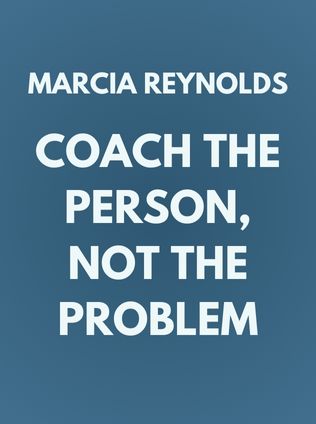
Coach the Person, Not the Problem
A Guide to Using Reflective Inquiry
By Marcia Reynolds
Published 06/2020
About the Author
Marcia Reynolds is not just an author; she is a beacon of transformation and a living testament to the power of coaching. Her journey from hitting rock bottom to becoming a globally recognized leadership and executive coach is both inspiring and instructive. At the age of 20, Reynolds found herself in a jail cell on drug abuse charges—a stark turning point that led her to pursue a life dedicated to helping others make meaningful changes in their lives. This experience, combined with her deep academic background—master's degrees in education and communications, as well as a doctoral degree in organizational psychology—forms the foundation of her unique approach to coaching.
Reynolds has worked with a wide range of corporate clients, including giants like AT&T and American Express, as well as universities and government agencies. She has also held leadership positions in the International Coach Federation, serving as its global president and director. Her other books, such as The Discomfort Zone, Wander Woman, and Outsmart Your Brain: How to Master Your Mind When Emotions Take the Wheel, further establish her as a thought leader in the field of coaching. But it's in Coach the Person, Not the Problem that Reynolds truly distills her philosophy, emphasizing the importance of understanding and challenging the underlying beliefs that keep individuals from achieving their potential.
Main Idea
At the heart of Coach the Person, Not the Problem lies a transformative idea: coaching should not be about solving surface-level problems. Instead, it should be about helping clients identify and confront the deep-seated beliefs and emotions that hold them back. Reynolds argues that true change can only occur when individuals are guided to explore and challenge these underlying assumptions. This approach requires a shift in the traditional coaching dynamic, moving away from the idea of the coach as an expert who doles out advice, towards a partnership where the coach and client work together to uncover the root causes of the client’s struggles.
Reynolds emphasizes that coaching is a deeply reflective process, where the coach's role is to support clients in investigating their thoughts and feelings, helping them to gain new insights and perspectives. This process, known as reflective inquiry, is central to Reynolds’ coaching methodology. By reflecting clients' words and emotions back to them, coaches can help clients break free from automatic thinking patterns and move towards meaningful, lasting change.
Table of Contents
- Understanding Coaching: Beyond Problem-Solving
- Mindsets and Skills Required for Effective Coaching
- The Reflective Inquiry Process
- Essential Coaching Practices
- Conclusion: The Power of Transformational Coaching
Understanding Coaching: Beyond Problem-Solving
In Coach the Person, Not the Problem, Reynolds redefines coaching as a partnership that goes far beyond the traditional notion of problem-solving. She argues that while it's easy to get caught up in addressing the immediate issues a client presents, doing so often only scratches the surface of what truly needs to be addressed. Instead, Reynolds proposes that coaches focus on the underlying beliefs and assumptions that drive these issues.
"Coaching is not about giving advice or solving problems for someone else," Reynolds writes. "It’s about helping people see and understand their own beliefs and assumptions, so they can choose to change them if they want to." This perspective shifts the role of the coach from being a problem-solver to being a facilitator of self-discovery and personal growth.
The essence of this approach is that lasting change comes not from external solutions, but from internal realizations. When clients are guided to examine their own thinking, they are more likely to make changes that stick. This is because they are not just applying a band-aid to a problem; they are addressing the root cause of their struggles.
Sign up for FREE and get access to 1,400+ books summaries.
You May Also Like
The Subtle Art of Not Giving a F*ck
A Counterintuitive Approach to Living a Good Life
By Mark MansonHow To Win Friends and Influence People
The All-Time Classic Manual Of People Skills
By Dale CarnegieFreakonomics
A Rogue Economist Explores the Hidden Side of Everything
By Steven D. Levitt and Stephen J. DubnerQuiet: The Power of Introverts
The Power of Introverts in a World That Can't Stop Talking
By Susan Cain



















